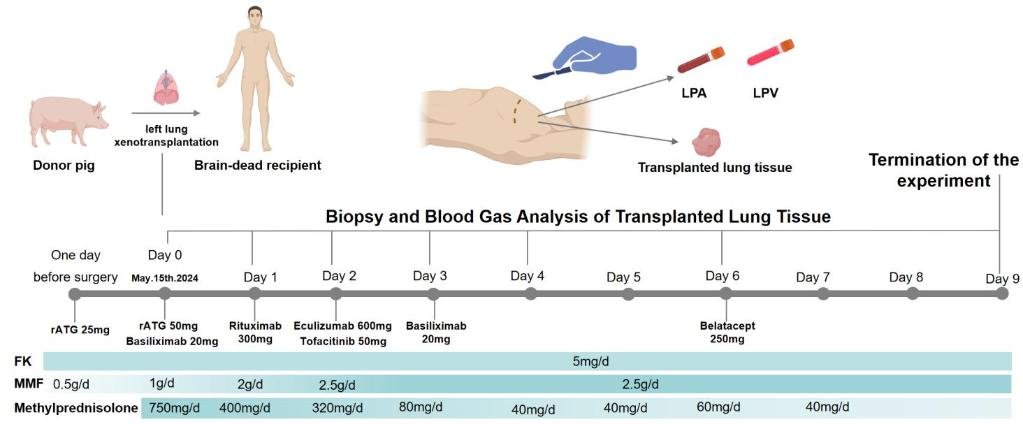Physical Address
304 North Cardinal St.
Dorchester Center, MA 02124
Physical Address
304 North Cardinal St.
Dorchester Center, MA 02124

Xinhua News Agency The Chinese research team published an online paper in the British academic journal Nature-Medicare on the 25th, reporting the world’s first case of successfully transplanting gene-edited pig lungs into brain-dead humans. This result is expected to help alleviate the problem of shortage of donors for lung transplantation and is hailed by international experts as a “mile mark” in related fields.
A research team led by He Jianxing, a professor at the First Affiliated Hospital of Guangzhou Medical University, transplanted a gene-edited Bamaxiang pig’s left lung into a brain-dead person to simulate a common clinical single-pulse transplant. The donor pig was gene edited by 6 genes to reduce the immune risk after its organ transplantation into the human body. After the operation, respiratory, blood, imaging and other monitoring data showed that the transplanted lung maintained ventilation and gas exchange function for up to 9 days, and no superacute rejection occurred during this period, and no signs of active infection were found during synchronous etiology monitoring.
“At present, the global demand for organ transplantation is increasing, and xenogeneic organ transplantation is believed to be expected to solve the dilemma of donor shortage.” He Jianxing told Xinhua News Agency reporters, “This achievement marks a key step in the field of xenogeneic lung transplantation.”
He said that the next step will be to further optimize gene editing strategies and anti-rejection treatment plans, extend the survival and functional maintenance time of transplanted organs, and apply the ductless technology independently developed by the team to xenogeneic lung transplantation trials to reduce the damage to donor lungs by mechanical ventilation and promote the transformation of xenogeneic lung transplantation into clinical application.

Schematic diagrams in the paper provided by the research team
According to the research team, this research plan strictly follows relevant national laws, regulations and ethical standards, and has successively passed the review and supervision of hospital ethics committees and other institutions. The subject had severe craniocerebral injury and was confirmed to have brain death after multiple independent evaluations. His family agreed to participate in the research free of charge in a desire to support medical progress. The study was concluded on day 9 at the request of the family.
Transplantation of xenogeneic organs to humans is a cutting-edge field of global medical research today, and international experts highly appreciate the results of this research. “Previous xenograft tests were limited to the kidneys, heart and liver. Compared with them, xenografts transplants face greater challenges. Because the lungs have subtle physiological balance, it accepts a large amount of blood flow and is continuously exposed to the outside air, it is particularly vulnerable to damage.” She said the results of the Chinese team are “a milestone” in related research areas.
Related readings: